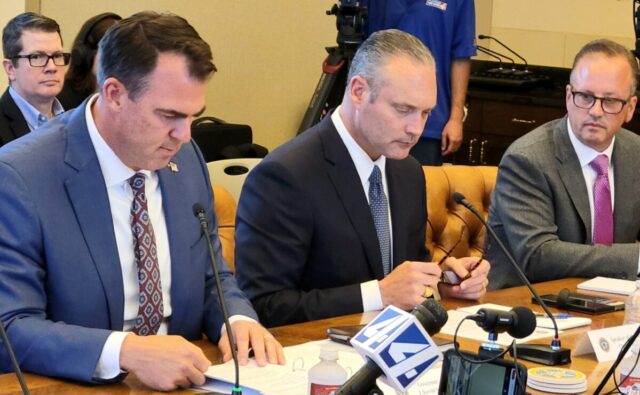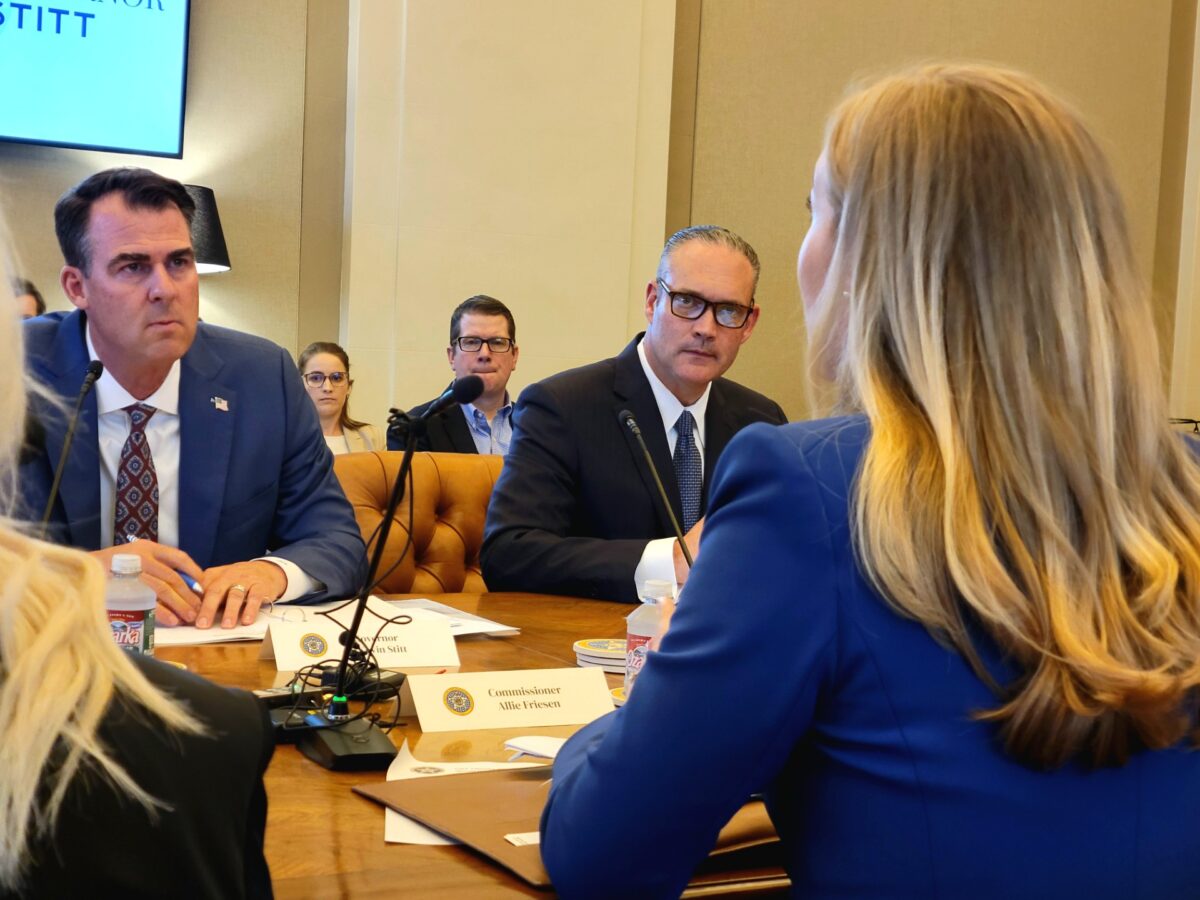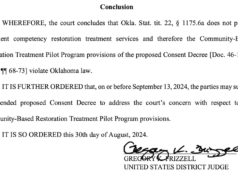

Gov. Kevin Stitt and House Speaker Charles McCall, at odds with Attorney General Gentner Drummond on his proposal to settle a class-action lawsuit dealing with Oklahoma’s competency restoration system for those accused of crimes while afflicted with severe mental illness, voted Wednesday to table the matter and not take action regarding a proposed consent decree carrying an undefined price tag for reforming state services.
“Before any agreement of this magnitude is finalized, we need to ensure that this is a good deal for all 4 million Oklahomans,” Stitt said. “We can and we must care for those in our justice system who are struggling with mental health conditions and also protect Oklahoma taxpayers.”
Allie Friesen, commissioner for the Oklahoma Department of Mental Health and Substance Abuse Services, said she told Drummond she could not support the proposed consent decree, which was announced in June.
“Across multiple occasions, in person, over the phone, and documents across several emails, I made it very clear that there were two non-negotiables for me, and I made it very clear time and time again that I cannot and will not agree to the consent decree as it’s drafted,” she said.
Drummond said Wednesday’s meeting of the Contingency Review Board, which consists of the governor, the House speaker, the Senate president pro tempore and the executive director of the Office of Management and Enterprise Services, was “a sham,” according to a press release his office issued ahead of it. Drummond said he was concerned the board would reject the settlement that “would save the state many millions of dollars.”
Although invited to attend the meeting, Drummond did not appear. Neither did anyone from his office, which was placed on the agenda for “presentation and discussion” of the proposed consent decree.
Instead, Drummond issued a press release.
“The governor appears bound and determined to force Oklahomans to ultimately pay untold millions of dollars and ignore a years-long failure of the state Department of Mental Health and Substance Abuse Services,” he said. “Rather than seizing an opportunity to deliver justice and save taxpayer dollars, Gov. Stitt would rather stage political theater. This is disappointing, if not entirely surprising.”
Also absent was Senate President Pro Tempore Greg Treat (R-OKC), who was called away for a family medical emergency, according to his spokesman. Attorney Rick Rose, whom Stitt named Wednesday as the new executive director of OMES, was present. Changing roles after years as McCall’s chief of staff, Rose becomes a non-voting member of the CRB as OMES director.
Drummond, in emails to the governor earlier this week, told Stitt the consent decree is not ready for review because the federal judge handling the class-action litigation has yet to approve several of its key terms. On Aug. 15, Frizzell presided over a hearing where he asked Drummond and plaintiffs attorneys for additional briefing about whether proposed new community-based competency restoration programs are legal under Oklahoma law.
In an email Monday, Drummond told Stitt that the CRB meeting was premature, and he recommended that it be rescheduled until Judge Gregory Frizzell gives preliminary approval to the settlement and consent decree.
“Our view is that we need preliminary approval from the court before we can/should discuss the consent decree (“CD”) with the CRB,” Drummond wrote. “To date, Judge Frizzell has not approved the proposed CD, and it is likely that the proposed decree may require some modification. To this end, if you convene the CRB, you do not have any CD that has achieved preliminary approval by the judge.”
Stitt, who chairs the CRB, responded the next day by saying the CRB would meet anyway
“At the least, the meeting will allow members an opportunity to learn more about the consent decree and context surrounding it,” he wrote.
Drummond responded that “there is no consent decree to approve.”
“We are awaiting the court’s decision on certain key terms, so what we have previously circulated to you is subject to change,” Drummond wrote. “Therefore, any discussion about terms or any action to decline or approve would be meaningless on a substantive basis. Your zeal to proceed out of order strikes me as more political theater than clear-eyed leadership.
“My objective is to support victims of crime, not to provide cover for a state agency that has failed to do its job for the last six years.”
Letter to be sent to judge noting opposition to proposal

After the meeting, McCall (R-Atoka) said he opposes approving the consent decree, at least as proposed. He said he told Drummond of his opposition when the attorney general told him about the offer in May.
“It puts the state of Oklahoma in a perpetual plan that I don’t believe will ever be met, because there will be third-party outsiders and attorneys that will make the decision whether or not the state has complied with the decree,” McCall said.
McCall said he will encourage Friesen to ask legislators for additional funding when agencies submit budget requests for the next fiscal year. Agency budget requests are due in October.
Stitt said his office would send a letter to Frizzell summarizing Wednesday’s meeting and stating his and McCall’s opposition to the proposed consent decree.
No date for another CRB meeting has been scheduled. The Contingency Review Board is rarely used. Its primary purpose is to consider settlement agreements of more than $250,000 when the Legislature is not in session.
McCall and Treat are term limited, with their extensive years of service expiring Nov. 19. Their designated successors cannot take any official action until legislators formally organize, which will be Jan. 7, he said.
Through their class-action complaint filed March 1, 2023, in U.S. District Court for the Northern District of Oklahoma, attorneys Leslie Briggs, Evan Watson and Henry Meyer have alleged violations of due-process rights for pre-trial defendants in state court who had been declared incompetent to stand trial and who were awaiting competency restoration treatment.
The attorneys filed their claim as the “next friends” of affected Oklahomans, and they allege the state’s failures force those deemed incompetent to endure lengthy wait times beyond what is “constitutionally permissible” for treatment at the Oklahoma Forensic Center in Vinita.
Drummond’s office called the lawsuit “indefensible” in a memo provided to lawmakers during this year’s regular session.
As approved by the Legislature in May, the state budget for this fiscal year includes $4.1 million appropriated to the Department of Mental Health and Substance Abuse Services to “be reserved for implementation of potential consent decrees entered during the 2024 calendar year.” But the specified improvement plan could obligate Oklahoma to provide future mental health funding many times more than the $4.1 million figure designated for Fiscal Year 2025.
“So, as it’s written today, a conservative estimate would place a burden of approximately $96 million over five years,” Friesen, who was appointed mental health commissioner by Stitt in January, said during Wednesday’s meeting. “So, there are lots of variables that go into that cost.”
The estimate does not include additional requirements from consultants and plaintiffs, she said.
“The plaintiffs have remained a decision-maker over the clinical decisions in conjunction with the consultants,” Friesen said. “So, this will likely not include the additional requests (…) to add additional funds and beds.”
Friesen said the money would have to be added to additional funding through appropriations from the Legislature, but she emphasized her belief that attorneys should have no place at the table when it comes to making clinical decisions and how to apply clinical practices. Under the proposal, a trio of expert “consultants” would be paid $450 per hour for their work over the five — at a minimum — years of the decree.
The proposal would require ODMHSAS to cease existing jail-based competency restoration programs around the state, but pilot programs for new jail-based programs would be created in Tulsa County and a county to be named later.
As initially drafted, the proposed consent decree also would create community-based competency restoration pilot programs, a somewhat controversial concept that has gained traction nationally in recent years.
“Within 90 days after the court enters this consent decree, defendants, in consultation with class counsel and the consultants, shall develop and begin to implement a plan, to be approved by the consultants, for a pilot community-based restoration treatment program in Tulsa County, Oklahoma County, McIntosh County and Muskogee County,” the proposed decree states on Page 23.
With none of the proposed community or jail-based restoration programs based in western or southern Oklahoma communities, some rural legislators have expressed an interest to learn more about how their areas would be served, especially since the proposal would require ODMHSAS to shut down its existing “in-jail competency restoration” program statewide, which launched in early 2023.
The Oklahoma Forensic Center in Vinita has 216 beds and is the only hospital operated by ODMHSAS that provides secure inpatient competency restoration services. The facility is also home to criminal defendants found not guilty by reason of insanity or mental illness until such a time that they are released from custody. Plaintiffs in the lawsuit have alleged that Vinita’s capacity issues have created unconstitutional and harmful treatment delays for criminal defendants in need of competency restoration services, which typically involves the administration and monitoring of anti-psychotic medications.
Plaintiffs have alleged that ODMHSAS’ failure to serve Oklahomans in a timely manner at the Vinita facility has left hundreds of mentally ill individuals in county jails, placing them in peril and complicating their pathways to restored mental health competency.
Friesen said work is underway to add 84 additional beds at the Vinita hospital, which she said should be available in June.
Pinnacle Plan 2.0?

The last time the Contingency Review Board was used to decide a large settlement came in January 2012, before legislators returned to session in February. The CRB members approved settlement of a federal lawsuit — D.G. v. Yarbrough — which alleged systemic problems with how the Oklahoma Department of Human Services handled children in the foster care system. Allegations involved the allowance of abuse, improper placement of children — even newborns — in overcrowded and under-staffed emergency shelters, and failure to provide secure long-term placements.
The Oklahoma Supreme Court declined to hear a lawsuit challenging the CRB’s 2012 action.
With Frizzell also presiding over that case, a 2012 compromise and settlement agreement — a remedial prescription differing slightly from a court-ordered consent decree — established the Pinnacle Plan, which required annual reporting about foster-care-system improvements and mandated monitoring from “co-neutrals” over the next decade.
In March 2023, the co-neutrals determined in their 19th report that substantial good-faith progress toward corrective goals had been made, but DHS is still reporting on seven metrics that were affected by the COVID-19 pandemic. DHS regularly reports on performance metrics back to the co-neutrals, and they issue commentaries twice per year.
Stitt said research by his office showed that DHS has spent more than $400 million on the Pinnacle Plan to date, with $18 million of that going to pay the co-neutrals, who held a similar role to the proposed consultants for the consent decree under consideration now..
McCall, who was elected in 2012, said legislators appropriated additional money to DHS to meet the obligations of the Pinnacle Plan because “the goalposts seem to get moved in that plan.”
“Is this decree — in your opinion, is it a Pinnacle Plan 2.0?” McCall asked Friesen during Wednesday’s meeting.
Friesen answered in the affirmative.
“Sadly, it’s very, very similar to the Pinnacle Plan,” she said. “It is also the similar structure with the consultants having the say in conjunction with the plaintiff’s counsel. It also has a similar impossibility of exiting the agreement over a reasonable time frame. And that has been one of the biggest catching points is, will we ever get to a point where we can satisfy, in the definition of a consultant, a reasonable compliance?”
(Correction: This article was updated at 10:55 a.m. Friday, Aug. 30, to note that DHS remains under monitoring in the Pinnacle Plan. NonDoc regrets the error.)



















